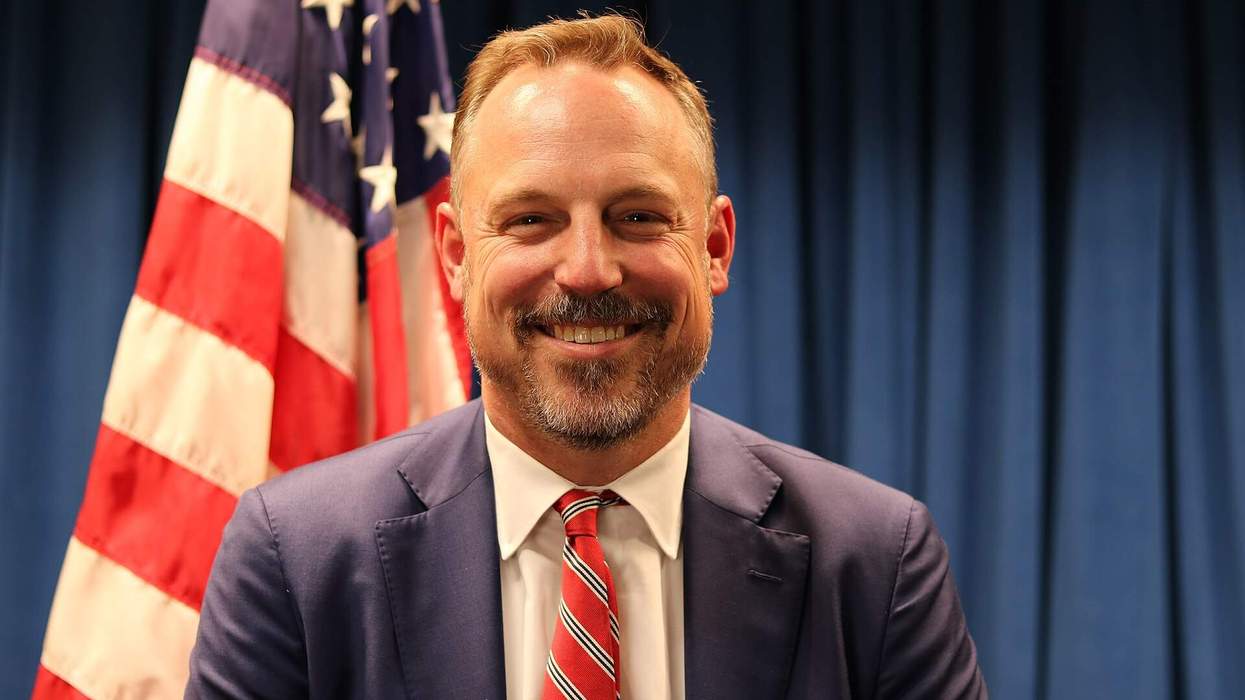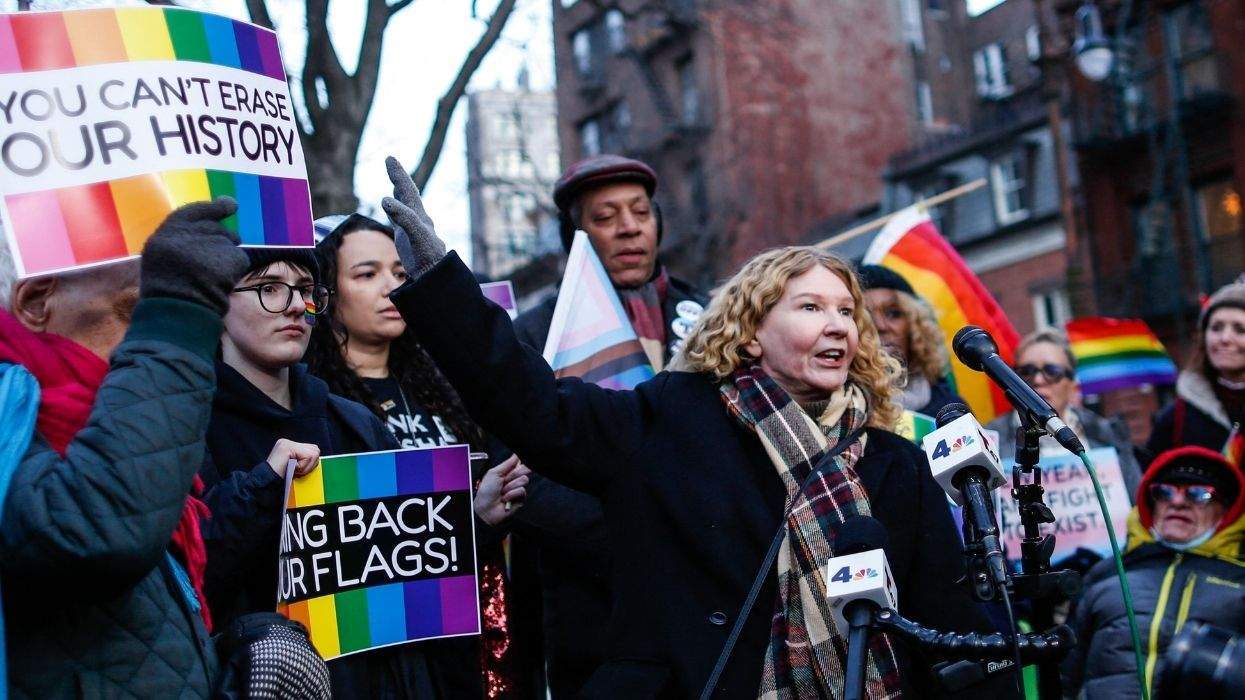The U.S. Supreme Court on Tuesday granted the Trump administration’s request to immediately enforce its ban on transgender military service, allowing the Pentagon to begin discharging service members with a diagnosis or history of gender dysphoria and to deny enlistment to transgender Americans. The unsigned order, issued over the dissent of the court’s three liberal justices, lifts a nationwide preliminary injunction and marks a major legal victory for President Donald Trump—and a devastating blow to thousands of currently serving troops.
Keep up with the latest in LGBTQ+ news and politics. Sign up for The Advocate's email newsletter.
The ban, authorized under Executive Order 14183 and implemented by Defense Secretary Pete Hegseth, mandates the expulsion of all transgender service members regardless of performance or qualifications, and blocks any future enlistment. The order issued Tuesday stays a March 27 nationwide preliminary injunction in Commander Emily Shilling et al. v. United States, allowing the policy to take effect immediately while appeals continue in the Ninth Circuit and potentially at the Supreme Court.
Related: Transgender service members warn SCOTUS of ‘Un-American’ purge if Trump ban is reinstated
Plaintiffs include U.S. Navy Commander Emily “Hawking” Shilling, a decorated combat aviator and test pilot who has flown more than 60 missions in Iraq and Afghanistan. She became the first transgender aviator cleared for tactical jet operations and continues to serve with distinction. Her case has become a flashpoint in the broader legal battle, with civil rights groups arguing the administration’s policy is rooted in political animus, not military readiness. The challenge follows a companion case on the East Coast in Talbott v. United States, a suit brought by GLAD and the National Center for Lesbian Rights.
LGBTQ+ advocates condemned the ruling. In a joint statement, Lambda Legal and the Human Rights Campaign Foundation, which represent plaintiffs in the case, called the decision “a devastating blow to transgender servicemembers who have demonstrated their capabilities and commitment to our nation’s defense.” The groups argued the policy “has nothing to do with military readiness and everything to do with prejudice,” adding that the ban “violates constitutional guarantees of equal protection and will ultimately be struck down.”
In a phone interview with The Advocate after the ruling, Lambda Legal CEO Kevin Jennings said, “We lost a really important battle today, but the war is not over. All this ruling does is say that the ban can go into effect while we continue to prosecute our case. It does not uphold the Trump trans ban.” Jennings emphasized that his team would now return to court to continue fighting to overturn what he called a “ridiculous, discriminatory” policy. “A lot of people will have their careers and perhaps even their lives ruined because of this ruling, but we’re not going to quit fighting,” he said.
Asked what he would say to transgender service members reading the story, Jennings offered a message of solidarity: “I’m sorry our court is so heartless and that unfortunately trans people are going to pay the price for their heartlessness. But we are not giving up. Neither should anyone else. We all need to keep fighting.”
The administration had sought an emergency stay from the Supreme Court after the Ninth Circuit denied a similar request on April 18. In their response brief last week, attorneys for the plaintiffs said the government’s request was based on a “shocking proposition that transgender people do not exist,” and argued the policy “fails under any level of review.” The brief emphasized that the active-duty plaintiffs have over 115 years of combined military service and over 70 commendations.
Related: Decorated pilot's lawyers urge Supreme Court to uphold block on Trump’s trans military ban
GLAD Law and NCLR also condemned the high court’s move. “The Supreme Court’s decision to allow the military ban to go into effect is devastating for the thousands of qualified transgender servicemembers who have met the standards and are serving honorably, putting their lives on the line for their country every single day,” Jennifer Levi, GLAD Law’s senior director of transgender and queer rights, told The Advocate in a statement. “Today’s decision only adds to the chaos and destruction caused by this administration. It’s not the end of the case, but the havoc it will wreak is devastating and irreparable. History will confirm the weight of the injustice done today.”
Shannon Minter, legal director of NCLR, added, “The Court has upended the lives of thousands of servicemembers without even the decency of explaining why. As a result of this decision, reached without benefit of full briefing or argument, brave troops who have dedicated their lives to the service of our country will be targeted and forced into a harsh administrative separation process usually reserved for misconduct. They have proven themselves time and time again and met the same standards as every other soldier, deploying in critical positions around the globe. This is a deeply sad day for our country.”
Media advocacy organization GLAAD also condemned the ruling. “Today’s news is a disgrace for all Americans, especially transgender service members who have been serving openly and honorably for many years,” said GLAAD President and CEO Sarah Kate Ellis. “Allowing this discriminatory ban to go into effect is out of step with the views of the American people, compromises military readiness, and will make America less safe.” Citing prior statements from military leaders, GLAAD noted that 56 generals and admirals had previously warned that barring transgender service would “degrade readiness even more than the failed ‘don’t ask, don’t tell’ policy.”
SPARTA Pride, a nonprofit organization composed of transgender people currently serving or who have served in the U.S. military, also issued a sharp rebuke of the Court’s action. “The Roberts Court’s decision staying the preliminary injunction will allow the Trump purge of transgender service members from the military to proceed,” the group said in a statement. “Every court up to now has found that this order is unconstitutional. Nevertheless, the Roberts Court—without hearing any evidence or argument—decided to allow it to go forward.” The group warned that thousands of troops “will lose their jobs, their commands, their promotions, their training, pay and benefits, and time,” calling it “the very definition of irreparable harm.” SPARTA affirmed it will continue standing in solidarity with all transgender service members.
Minter and Levi are transgender themselves and have successfully advocated for the protection of LGBTQ+ rights in previous cases. Advocates note that the 2025 ban goes even further than Trump’s earlier policy from his first term—eliminating all exemptions for those already serving, providing no grandfathering clause, and requiring immediate discharges. The Biden administration reversed that earlier policy, known as the Mattis Plan, in 2021.
The Supreme Court’s ruling comes amid mounting legal resistance to the ban, including separate cases in Talbott v. United States in Washington, D.C., and Ireland v. Hegseth in New Jersey, where courts have also expressed skepticism toward the administration’s justification. U.S. District Judge Ana Reyes, who presides over the Talbott case, found the 2025 ban likely unconstitutional and “motivated by animus.”
This story is developing and has been updated.
















Charlie Kirk DID say stoning gay people was the 'perfect law' — and these other heinous quotes
These are some of his worst comments about LGBTQ+ people made by Charlie Kirk.